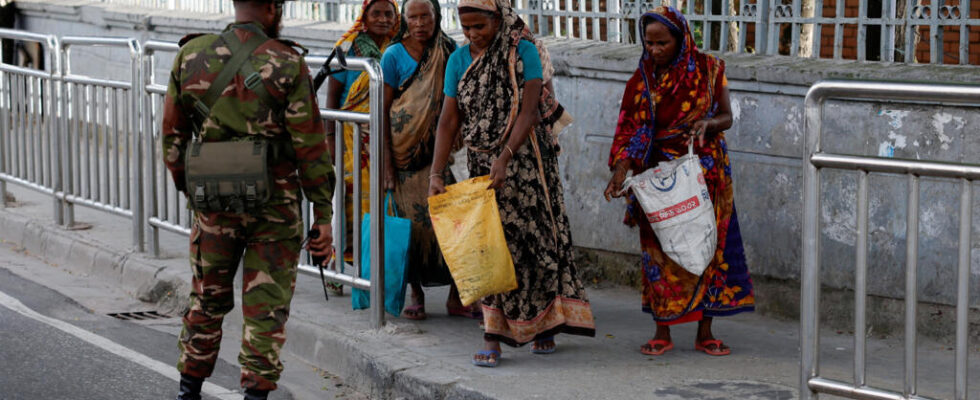For almost a week, Bangladesh has been counting its dead and wounded every day as an unprecedented uprising takes place against Prime Minister Sheikh Hasina. By announcing job quotas perceived as privileges, the latter brought the youth and then the entire population onto the streets. The Supreme Court, the country’s highest court, ruled this Sunday, July 21, removing 93% of the job quotas.
4 min
At BangladeshWhat began as a protest against admission quotas for coveted government jobs this week led to the worst violence under Prime Minister Sheikh Hasina’s 15-year rule. Protesters say the quotas benefit the ruling power.
Since Tuesday, July 16, at least 151 people, including several police officers, have been killed in clashes across the country, according to a count carried out by AFP based on data from police and hospital sources. Protesters continue to defy the police everywhere, despite the introduction of a of a curfew and the closure of universities, where the movement began.
This Sunday was a decisive day as the Supreme Court, the highest court in the country, ruled on these controversial quotas by lowering them sharply, without abolishing them completely. The court decided that 93% of public sector jobs should be open to candidates based on merit, without quotas.
” Supreme Court says High Court verdict illegal ” said Attorney General AM Amin Uddin. He specified that 5% of civil service jobs would remain reserved for children of veterans of the war of independence and 2% for other categories.
Attorney General AM Amin Uddin referred to an earlier ruling that reintroduced quotas. Prime Minister Sheikh Hasina’s government scrapped the quota system in 2018, but a court reinstated it last month, sparking protests that were suppressed by the government.
The Supreme Court on Sunday also urged students to ” return to class ” after the violence, said Shah Monjurul Hoque, a lawyer who represented two students in a case seeking to abolish the quota system.
” Rather than trying to address the protesters’ grievances, the government’s actions have made the situation worse. »
With Bangladesh failing to provide adequate employment opportunities for its 170 million people, the quota system is a major source of resentment among young graduates facing a severe crisis. Sheikh Hasina, whose government is accused by her opponents of bending the judiciary, had hinted earlier this week that the system opposed by the protesters would be scrapped. But some protesters are demanding her resignation, our correspondent in Bangalore reports, Côme Bastin.
After growing repression In the face of the recent surge in the number of deaths, it is unclear whether this decision by the Supreme Court will appease the protesters. It’s not about students’ rights anymoresaid Hasibul Sheikh, 24, a business owner, at the scene of a protest in the capital Dhaka on Saturday, despite a nationwide curfew. Our request concerns only one point. : the resignation of the government » by Sheikh Hasina.
Demonstrations have been almost daily since the beginning of July. Despite the internet cuts, videos are circulating on social networks showing police shoot live ammunition on the crowd. The prime minister compared the protesters to agents of Pakistan, a reference to the 1971 liberation war that enraged the demonstrators. Rather than trying to address the protesters’ grievances, the government’s actions have made the situation worse. ” reacts Pierre Prakash, director of the Crisis Group for Asia.
As the situation remains very tense, the world has its eyes turned towards Bangladesh, a country of 171 million inhabitants that is sometimes ignored. India, a neighbor and ally, judges the worrying situation and has already evacuated 1,000 of its students. The United States and Canada have expressed grave concern about the violence. The U.S. State Department on Saturday advised Americans against traveling to Bangladesh and said it would begin repatriating some diplomats and their families.
The Bangladeshi prime minister was due to leave the country on Sunday for a diplomatic tour of Spain and Brazil. But she has cancelled her plans due to the ongoing violence.
Tensions are spilling over into the United Arab Emirates, where Bangladeshi protesters have been arrested
With our correspondent in Riyadh, Joseph Clement
Officially, the Emirati authorities have not given a precise toll of the arrests. They speak of groups of rioters arrested this Friday or Saturday, without saying where these arrests took place. Still officially, the police coup is justified by the fact that the protesters were blocking or obstructing traffic.
But in reality, the UAE takes a dim view of public expression by Bangladeshi nationals on its territory. Protests are generally met with harsh punishment in the Emirates, as is any speech that could lead to social unrest.
This is ironic, given that Bangladeshi nationals are among the largest foreign communities in the country and provide the country with cheap labour, particularly in the construction sector. This million-strong community has been left without news of their families in Bangladesh since internet access was severely disrupted in the turmoil of the protests against leader Sheikh Hassina.
Also listen toBangladesh protests: ‘Prime Minister’s departure is not an option’
